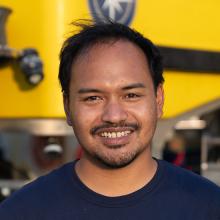
Rendhy Sapiie
Tell us about your work/research. What kinds of things do you do?
My study encompasses on a combination of underwater acoustics, underwater robotics, and underwater imaging with a focus on why deep-sea creatures avoid most of our surveying tools/ocean vehicles during observations. The end goal is to ultimately build systems that are 'stealthier' for observing deep-sea biology. There are major challenges when we survey the ocean: The deeper we go more pressure is exerted on our equipment and less light exists in this region, hence we use vehicles that are large in size and produce heaps amount of artificial lighting that may disturb animals and scaring them away. Therefore, the lab that I work in at the University of Rhode Island specializes in designing, fabricating and testing novel ocean surveying equipment with that philosophy in mind that may enable us to peek into the secrets that the deep ocean has to offer.
What sparked your initial interest in your career?
Before I started my career path as an ocean engineer, I obtained my undergraduate degree in Physical Oceanography from Indonesia with a focus on tsunami modeling. While studying about big events like tsunamis was fascinating, however as I progressed through my carrier I realized that the data collection side of oceanography was very important, although underdeveloped especially in Indonesia. Eventually, I found out about ROVs and ocean vehicles that explore the ocean in-situ and that engineers work closely with scientists to find new discoveries.
Who influenced you or encouraged you the most?
My father as a geologist inspired me to study natural sciences and whom I learned from that fieldwork and theory are equally important. I also had a mentor when I interned in an ROV company who I had engaging and profound discussions regarding ocean exploration and technology. I also read books and watched documentaries from two prominent scientists, explorers, and engineers that influenced me to study the ocean: Jacques Costeau and Walter Munk.
What element of your work/study do you think is the most fascinating?
I have always enjoyed doing fieldwork, especially as an ocean engineer. The excitement of preparing everything to ensure everything works, things still break down and new problems emerge, coming up with quick solutions and finally getting the mission to succeed is so rewarding. Additionally, traveling due to work/study enables me to visit different places around the world.
What other jobs led you to your current career?
Post-graduation, I worked as an independent contractor for oceanographic surveying. After several projects, I realized that obtaining ocean data is expensive and that most of the funds used for ocean-related projects are poured into operations and equipment. Since technology is getting cheaper and the availability of open-source software/hardware, I wanted to create low-cost ocean observation equipment that is cheaper to deploy. This realization inspired me to pursue work related to the engineering side of oceanography. However, not having a background in engineering did deter me initially until I found an opportunity to intern at the one and only ROV manufacturer company in Indonesia. This company was very supportive despite my background and by working in ROV operations, I was able to understand the engineering thought process. Not long after, I applied for graduate school at the University of Rhode Island majoring in ocean engineering, and was accepted.
What are your degrees and certifications?
Bachelor of Science in Physical Oceanography - Institut Teknologi Bandung, Indonesia 2014; Masters of Science in Ocean Engineering - University of Rhode Island 2018; Diving PADI Advanced Certification
What are your hobbies?
To keep my sanity levels checked, I enjoy exploring nature and anything outdoors related: hiking/backpacking, cycling, mountain biking, swimming, surfing and snowboarding. Been doing this even more since COVID19.
What advice would you give someone who wants to have a career like yours?
Unlike the ocean covering 70% of the world, the ocean community is quite small and tightly knitted. Going to school for many years has taught us to deeply specialize on a certain subject. While this will be beneficial for landing opportunities in that specific field, however if we broaden our perspective on different fields of knowledge and connect the dots between them, we can always find new and fresh ideas to work on. Collaboration has never been this exciting, so focus on generating new and meaningful connections. Learning something new or switching gears despite not understanding the basics is very possible and is never too late. Be patient, persist, never feel embarrassed to ask questions or reach out. Look out for great mentors to always feel inspired and give that additional push.
How did you get involved with the Ocean Exploration Trust?
I remember learning for the first time about the Nautilus program and Ocean Exploration Trust during my undergraduate studies around 7 years ago. Since I started graduate school, I have always wanted to apply, however never finding a perfect time window. Recently, my PhD advisor encouraged me to apply for the program and eventually I got admitted into the team as a ROV engineer intern. Looking back as an undergraduate in Indonesia, I would never imagine that I could be part of the expedition team now.
Expeditions
Rendhy participated in the following Ocean Exploration Trust expeditions:
